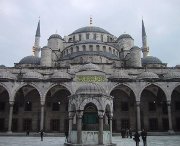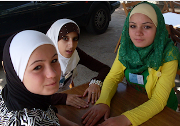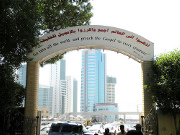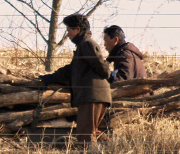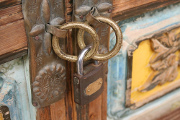Boko Haram Islamic extremist finds weak link in military security chain.
By Abdias Pasoville
 |
Collapsed building of the Christ’s Chosen Church of God
Photo courtesy: Compass Direct News |
JOS, Nigeria, June 10 (Compass Direct News) – An Islamic extremist ran a car full of explosives at a Pentecostal church in this Plateau state city this morning, killing at least two Christians and injuring more than 40 others, military and police officials said.
In Borno state also today, gunmen reportedly killed at least two Christians during church worship. The Boko Haram Islamic sect reportedly took responsibility for both assaults.
The attack in Jos on Christ’s Chosen Church of God was the second suicide bombing of a church in two Sundays and the third church bombing in Jos in six months. The explosion, which hit after a service had ended and church leaders and some children remained in the building, collapsed the roof of the sanctuary, witnesses said. The death toll was expected to increase as injuries were severe.
It marked the second consecutive Sunday that an extremist from the Boko Haram Islamist sect has been able to get through check-points to bomb a church, and reports followed of rioting by aggrieved youths that left further casualties.
Esther Solomon, a 31-year-old university student whose family’s house sits directly opposite the church building, told Compass that a pastor, church elders and some children remained in the sanctuary at the time moment the bomb was detonated. She said she was in her family living room at the time.
“I heard this loud explosion that broke window glass. The impacts of the explosion forcefully opened the front door of our house and threw me into one of the bedrooms,” Solomon said. “I just found myself in the bedroom, and when I rushed out, I found out that a suicide bomber had crashed into the church across the road.”
Rahab Gunat, 41, said the suicide bomber was seen trying first to bomb two churches, St. Peter’s Catholic Church and the Evangelical Church Winning All (ECWA), each like Chosen church located along Rukuba Road, but could not gain entry. The bomber then targeted Christ’s Chosen Church of God, though officials said he was stopped short of the building before detonating the explosives.
“He was seen trying to go to the ECWA church, but he was prevented from doing so by members of the Boys Brigade [similar to Boy Scouts] who were keeping watch over the church,” Gunat said. “From there, he went to the St. Peter’s Catholic Church, but was denied entry too, but when he found that there was no security in this church, he crashed into it.”
Celina Malo, 20, whose family’s house is just a few meters from the collapsed church building, told Compass that she was preparing for a bath when the bomb exploded.
“I heard a loud explosion that brought down the ceiling of our house, shattered all glass of our windows and violently brought down household items,” she said. “I was confused and began crying.”
Her two younger sisters, ages 8 and 11, were also crying, she said.
“I rushed outside to see what had happened and saw that it was a car that had crashed into a nearby church, and people inside were crying,” Malo told Compass.
She said that when she rushed out of her house, she saw the daughter of the pastor of the Christ’s Chosen Church of God crying outside the demolished structure.
“Her name is Victory, and she told me that her dad, the pastor of the church, and her mom, were both inside the church,” Malo said. “As we were thinking of what to do, people around rushed here to rescue people trapped in the church. Many have been injured, and they have been taken to the hospital.”
Malo added that she assisted in moving the 10-year-old son of the church pastor, Peter, away from the bombed church before he was taken to a hospital.
“The boy was bleeding from wounds he got in the explosion,” Malo said.
The News Agency of Nigeria reported that the church pastor, Monday Uzoka, and a church elder were in critical condition following the blast.
Malo’s mother, who was out of the town at the time of the bombing, arrived as Malo spoke with Compass and began to cry upon seeing her daughters.
“I am happy my children are alive,” she explained. “I praise God that I met them alive.”
The injured were being treated at Bingham University Teaching Hospital, Jos University Teaching Hospital and the Plateau State Specialist Hospital, all in Jos.
In Biu, Borno state, gunmen reportedly shot at worshippers as they were leaving a worship service before entering the sanctuary and killing two Christians. The Borno state police commissioner reportedly confirmed the attack on the Church of the Brethren in Nigeria (EYN in the local Hausa language) congregation.
On June 3 in Bauchi state, a Muslim suicide bomber from the Boko Haram sect attacked the Living Faith church in Yelwa, a Christian settlement on the outskirts of the northern Nigerian city of Bauchi, killing 13, with allegations following that authorities killed eight others who were protesting the lack of security. The blast also collapsed a wall of the nearby Harvest Field Church of Christ, leaving three people in critical condition.
Literally meaning “Forbidden Book” and translated as “Western education is forbidden,” Boko Haram has targeted churches, state offices, law enforcement sites and some moderate mosques in its effort to destabilize the government and impose a strict version of sharia (Islamic law) on all of Nigeria.
Nigeria’s population of more than 158.2 million is divided between Christians, who make up 51.3 percent of the population and live mainly in the south, and Muslims, who account for 45 percent and live mainly in the north. The percentages may be less, however, as those practicing indigenous religions may be as high as 10 percent of the total population, according toOperation World.
END
*** A photo of the collapsed building of the Christ’s Chosen Church of God is attached for subscribers, to be used with credit to Compass Direct News. A high resolution photo is also available; contact Compass for transmittal.
**********
Copyright 2012 Compass Direct News



